China Warns Hong Kong Protesters, But It Has Few Realistic Options
Beijing is warning protesters in Hong Kong that it's restraint in the face of protests is not without limit. However, it has few realistic options when it comes to how far it can go.
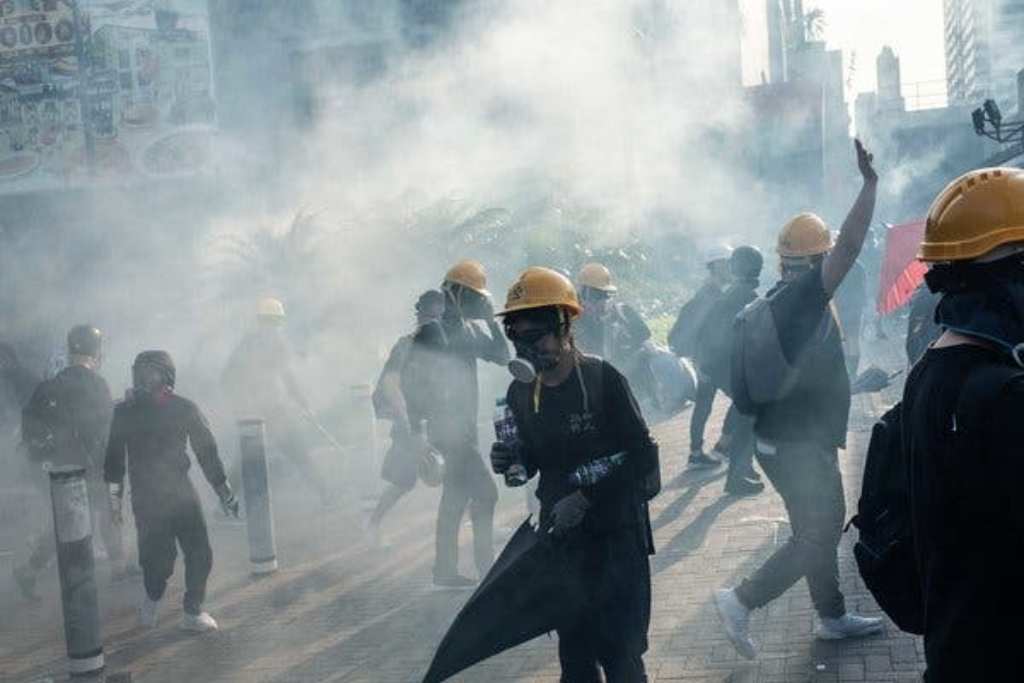
With protests continuing, the Chinese government in Beijing seems to be warning that the restraint it has supposedly shown in dealing with protesters may not last very much longer:
HONG KONG — An official in Beijing on Tuesday issued China’s sternest denunciation yet of the demonstrations in Hong Kong, saying they had “exceeded the scope of free assembly” and warning that the semiautonomous city would not be allowed to descend into chaos.
“I want to warn all the criminals to not wrongly judge the situation and take restraint for weakness,” said Yang Guang, a spokesman for the Chinese government’s Hong Kong and Macau Affairs Office. He warned against underestimating China’s “firm resolve and strength to safeguard the prosperity and stability of Hong Kong.”
But Mr. Yang offered little in the way of concrete measures to resolve the political crisis, calling for more patriotic education and encouraging residents to confront protesters. “We need to stand up to protect our wonderful homeland,” he said.
The comments came a day after protesters in Hong Kong carried out their most widespread civil disobedience in weeks of demonstrations, blocking trains and roads and urging workers to strike. Air travel was also snarled, with more than 200 flights canceled after 2,300 civil aviation workers stayed home, according to an estimate by union officials.
Mr. Yang denounced the tactics of protesters who have surrounded police stations, throwing bricks and lighting fires, as “extreme violence that is shocking to see.”
He said, “The central government will never allow any violent attempt to push Hong Kong into a dangerous situation.”
Protesters gathered at more than a half dozen sites across Hong Kong on Monday, and the police arrested 148 people and fired 800 canisters of tear gas. The tear gas used on Monday alone came close to the 1,000 rounds that the police had used over the previous eight weeks.
Joshua Wong, a leader of the 2014 Umbrella movement and a prominent pro-democracy activist in Hong Kong, said Mr. Yang’s comments were an attempt to scare the people of the city into silence.
“Beijing does not rule Hong Kong by law, they just rule by tear gas,” he said.
(…)
Mr. Yang also warned protesters to not challenge China’s sovereignty, denouncing those who defaced the Chinese government’s representative office in Hong Kong last month and threw Chinese flags into Victoria Harbor in recent days. He criticized protesters’ use of a slogan from an imprisoned activist who once advocated Hong Kong’s independence:
“Liberate Hong Kong; revolution of our times.”
(…)
A spokesman for China’s Ministry of National Defense hinted last month that the People’s Liberation Army could be called on to maintain order in Hong Kong. The military has a garrison of 6,000 to 10,000 soldiers in Hong Kong, but local officials have repeatedly denied rumors that they have been preparing to help quell demonstrations.
Last week, the Hong Kong garrison released a video showing its troops training to confront protesters. And images have been released of large groups of mainland police officers holding drills in preparation for the Oct. 1 celebrations of the 70th anniversary of the founding of the People’s Republic of China. Those images have also fueled unsubstantiated rumors about the possible intervention of Chinese forces.
Asked if he could rule out an intervention by the Chinese military, Mr. Yang said China would “never allow a challenge to the principle of ‘one country, two systems’ to go unpunished and will never allow any turbulence that will threaten national unity.”
While these warnings sound ominous, The Washington Post notes that Beijing actually has very good options:
With violent protests roiling Hong Kong’s streets for the 10th consecutive week, posing the most serious challenge to the Communist Party in decades, Xi appears to be caught with no good options as he heads into one of the most politically sensitive periods of his tenure.
For Xi, an attempt to forcefully suppress the unrest with the Chinese military would end Hong Kong’s status as an international financial hub and deal a serious blow to his ambition of bringing Taiwan, the self-ruled island that split from mainland China in 1949, under Communist Party control.
In his second appearance in a week, a top official from China’s Hong Kong policy office, Yang Guang, reiterated Tuesday that Beijing maintained its support for Hong Kong’s embattled leader, Carrie Lam. Yang voiced tough warnings about the consequences of violent protests, but he appeared to play down the prospect of China’s mobilizing the People’s Liberation Army to quell the dissent.
Yet calm in Hong Kong appears to be more elusive than ever as the clock runs down on Beijing’s political calendar. The Communist Party is preparing for the 70th anniversary of the founding of the People’s Republic of China, an event the party plans to celebrate this fall with a massive military parade — and one that cannot be marred by embarrassing hitches, such as scenes of defiant protests in a major city.
If “our Pearl of the Orient” — as Chinese state media called Hong Kong in a recent propaganda push — were to still be seized by protests and strikes on China’s National Day, Oct. 1, it would directly undermine Xi’s narrative that a strong Communist Party under his muscular leadership is leading the Chinese people toward greatness and unity.
“On the one hand, Xi can’t let this drag on too long — he is pursuing the so-called China Dream to make China great again,” said Warren Sun, an expert on Chinese politics at Monash University in Australia. “On the other hand, he needs to be very careful because the international world, including Trump and Taiwan, are watching to see if he mishandles things.”
Along with the trade war with Washington, the predicament of how to manage Hong Kong, Sun said, will probably head the agenda at the Communist Party leadership’s secret annual meetings at the Beidaihe resort this month.
With the clock ticking, Beijing appears to be stuck in a holding pattern, even though its officials and state media have steadily dialed up nationalist rhetoric and sounded alarms about the “black hand” of the CIA orchestrating the chaos in Hong Kong.
Hong Kong’s government and police, said Yang, the policy official, are “completely capable of protecting law and order” by themselves.
Still, Yang appeared to strike a restrained note days after the Chinese army garrison in Hong Kong released a provocative video showing soldiers training to put down civil unrest. On Tuesday, mainland police in the Chinese tech hub of Shenzhen, just across the border from Hong Kong, released a similar video showing forces training to suppress rioters wearing yellow hard hats — something seen on the streets of Hong Kong.
[Hong Kong strike cripples city as leader warns of ‘dangerous situation’]
In recent days, too, Hong Kong police have showed a waning tolerance for the protests and have significantly increased their use of force.
All of this began several months ago now when Hong Kong residents began taking to the streets to protest an extradition bill being considered by the city’s government. The protesters feared, with good cause, that the bill would make it easier for the government in Beijing to extradite Hong Kong residents to mainland China where they would face a trial utterly devoid of the civil liberties protections they have pursuant to the 1997 agreement that returned Hong Kong to Chinese control. Initially, the city government responded to the protests by suspending consideration of the bill, but that wasn’t sufficient for protesters who continued their protests until the government relented by formally pulling the bill from consideration. It quickly became apparent, though, that this wasn’t sufficient and the protesters have expanded their demands to include the removal of several key city officials. The protests expanded at that point, bringing more people to the streets, and also appeared to have become violent, largely in response to harsh measures by city police and what appear to have been the actions of provocateurs. By that point, even the leader of Hong Kong declaring the extradition bill dead wasn’t enough for the protesters, who have continued to take the streets in smaller protests during the week and large ones on the weekends. The most recent protest took the form of a largely successful General Strike that may be repeated on October 1st when China marks the anniversary of the founding of the Chinese Communist Party. All of this has obviously tested the patience of the leadership in Beijing, and it’s obvious that they would not have been exercising restraint if protests like this were occurring anywhere in the country other than Hong Kong.
Another factor motivating China to restrain itself in Hong Kong, of course, is the fact that the leadership is wise enough to know that doing so would be a disaster both in terms of the widespread coverage it would receive from the western media, which is well-established in the city, and internationally. Even in this era where prosperity is becoming more widespread in China a whole, Hong Kong remains the goose that laid the golden egg and the leadership in Beijing is obviously too smart to mess that up. There’s always the possibility that they will lose patience in one of these situations and that they will overreact to the protests in Hong Kong as they did in Tiananmen. At that point, though, they may find that they’ve bitten off more than they can chew.

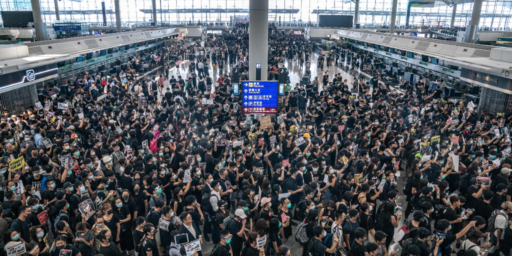
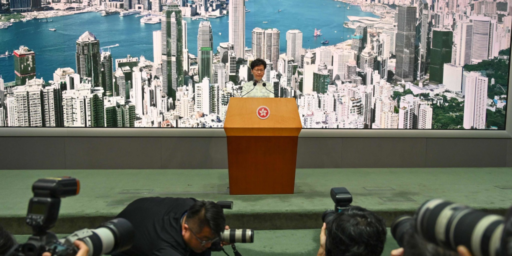
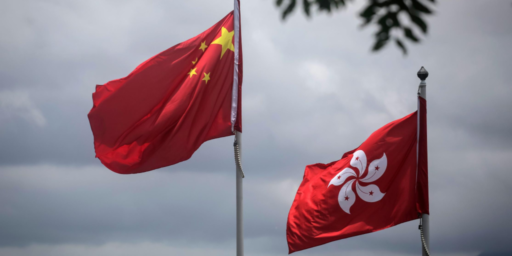
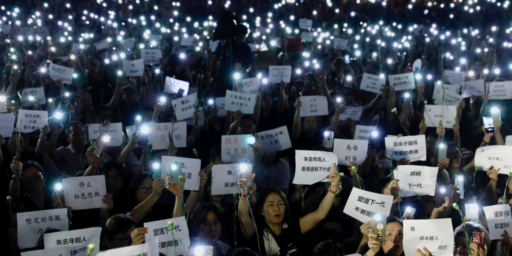
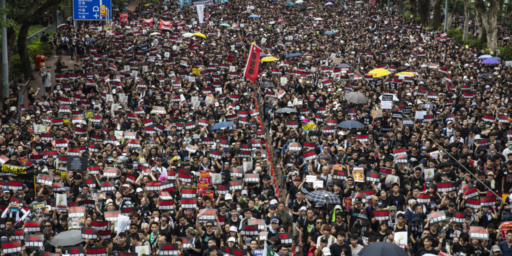
“The beatings will continue until morale improves.”
China’s already engaged in a full on concentration-camp style Genocide and the world doesn’t care as long as they keep getting their cheap iphones. Why makes you think the world will do anything if China decides to drive tanks over the Hong Kong protestors?
@Stormy Dragon:
True, but the Uighurs are Muslim and as we know, in much of the west it is considered good form to persecute Muslims, so China gets a pass. But Hong Kong would be different, most of the world, except Tiny, would raise a fuss. And of most concern, foreigners would withdraw their money from Hong Kong banks.
If Xi truly feels he faces a choice between killing the golden goose or losing control, he’ll kill the goose. I’m sure he wants to find a way to avoid that stark choice, but it’s getting harder and harder to see a path forward that doesn’t end in the protesters getting away with giving the finger to China (absolutely unacceptable) or a crackdown and damn the consequences. He’s probably hoping the protests burn themselves out, but if they don’t the economic consequences of a crackdown will be of secondary importance to the Chinese leadership in general and Xi in particular.
@Just Another Ex-Republican:
That’s my take, too. Always maintain control. That will always be the priority.
If it were Deng Xiao Ping I think he would be very unlikely to send in the soldiers unless protests spread outside of Hong Kong. With Xi though, I’m not so sure. However, the idea that they have few options is not correct. They may have few short term options but it is very clear what they will do next: allow more mainland Chinese to emigrate to Hong Kong and make it even easier for native HKers to emigrate. Xi has indicated this with very little subtlety in the past, threatening to “open the train station”.
The only thing that is holding them back is the concern that HK democratic ideas will infect the new arrivals, who in turn will return to the mainland during holidays and vector out that infection.
@Stormy Dragon: I agree with that and there is no reason to think that it won’t happen again. The only way to prevent that is for other nations to warn the Chinese leadership that another Tiannamen will not be tolerated. They got by with it before. Time to hold China accountable for their harsh policies and quit giving them a free ride, and control over so much.
@Tyrell:
Uh huh.
Except A: we’ve already shot our wad with China, thanks to Trump’s idiotic trade war.
And B: Our ‘allies’ no longer pay any attention to what we say, because our president is a fckin idiot.
And C: We’ll be lucky if all Xi does is crack down on Hong Kong. Trump has stirred Chinese nationalism, and that could spell trouble for Taiwan. That’ll be fun.